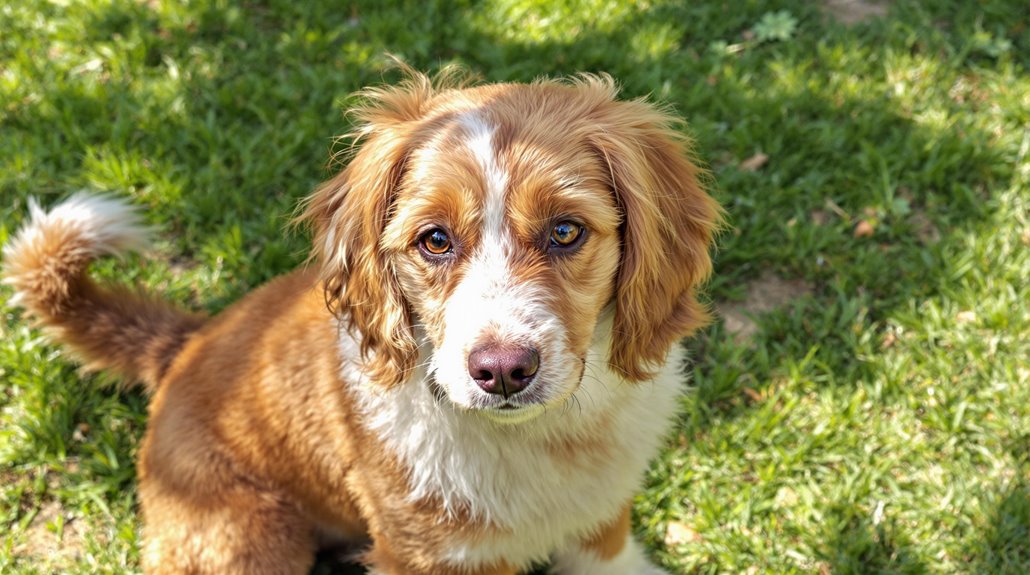A Boxerdoodle might be right for you if you're seeking an intelligent, loyal family dog that combines the Boxer's protective nature with the Poodle's smarts. These designer dogs range from 12-80 pounds and need 45-60 minutes of daily exercise plus regular grooming sessions. You'll invest $600-900 yearly in insurance and $50-100 monthly for food. They're great with kids and other pets when properly socialized, though they require consistent training from puppyhood. Consider your lifestyle, space, and budget carefully – Boxerdoodles thrive with active families who can commit to their exercise and grooming needs. Our complete guide will help you make this important decision.
Understanding the Boxerdoodle Mix
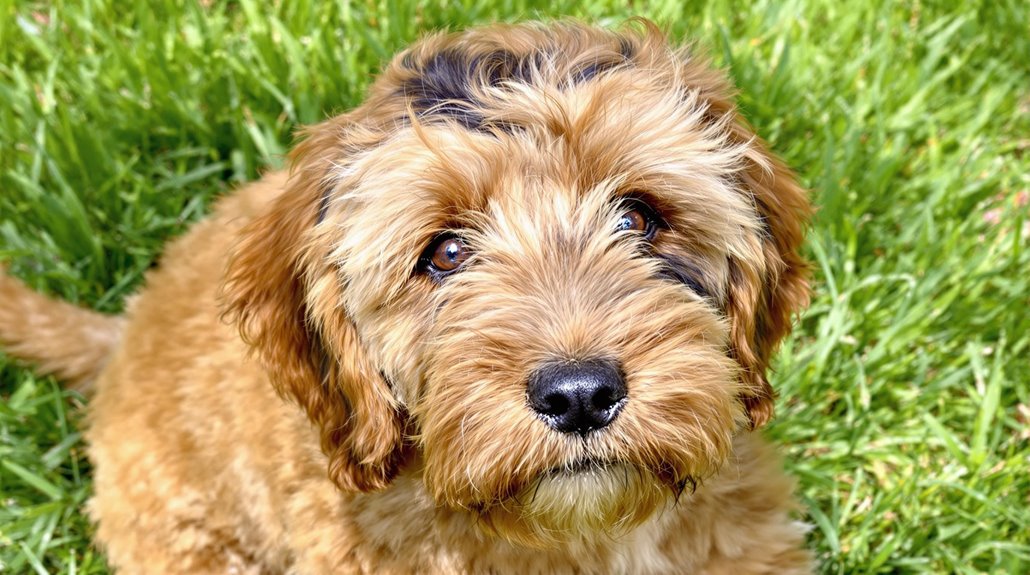
The Boxerdoodle comes into its own as a dynamic hybrid breed, combining the best traits of the athletic Boxer and the intelligent Poodle. This highly intelligent Boxer-Poodle mix brings together the loyalty and playfulness of both parent breeds, making it an excellent companion for active families who enjoy engaging with their pets.
When you're considering a Boxerdoodle, you'll find they come in various sizes and coat types:
- Standard size: 40-70 pounds, 21-27 inches tall
- Mini size: 20-50 pounds, 12-20 inches tall
- Coat varieties: Curly, wavy, or straight
- Colors: Brown, black, tan, fawn, red, gray, cream, and white
These dogs require dedicated training and socialization from an early age to channel their intelligence positively. You'll need to commit to at least 60 minutes of daily exercise to keep your Boxerdoodle mentally and physically stimulated. While they may face some health issues common to both parent breeds, like hip dysplasia and eye problems, they often benefit from hybrid vigor, potentially resulting in fewer health concerns than purebred parents.
Appearance and Physical Traits
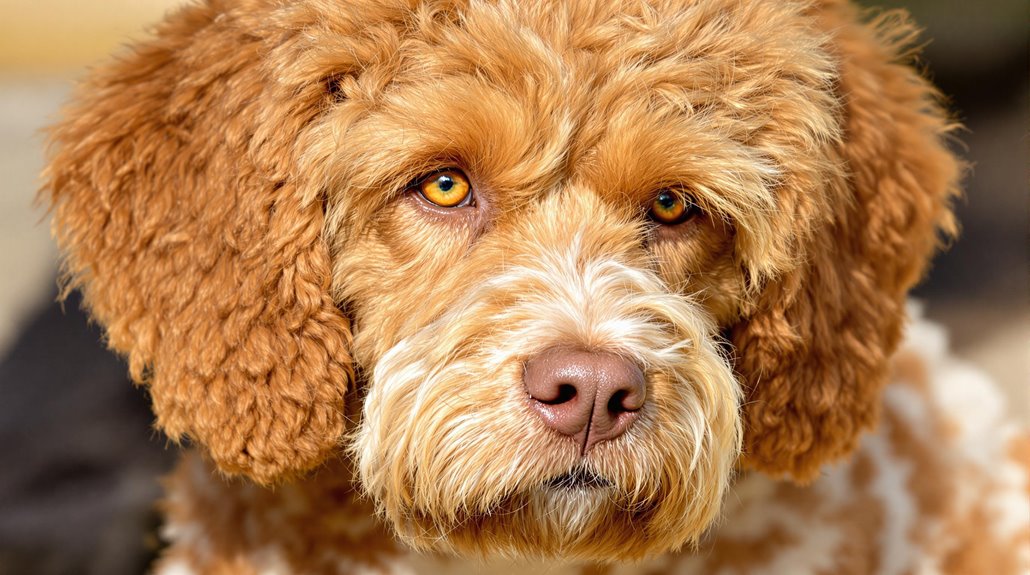
Physical characteristics of Boxerdoodles showcase remarkable variety, largely due to their mixed heritage. You'll find these dogs range greatly in size, weighing anywhere from 12 to 80 pounds and standing between 10 to 25 inches tall at the shoulder.
When it comes to appearance, your Boxerdoodle's features will reflect both parent breeds in unique ways. The coat types can vary from tightly curled Poodle-like fur to smoother Boxer-style coats, appearing in colors such as white, black, red, fawn, brindle, or brown. You'll notice their facial structure might lean toward either the refined Poodle snout or the distinctive Boxer jaw.
For potential owners, it's important to understand the grooming commitment these physical traits require. You'll need to maintain your Boxerdoodle's coat with regular brushing at least three times weekly to prevent matting. While they're generally considered low-shedding dogs, their grooming needs aren't low-maintenance.
The combination of Boxer and Poodle genes creates distinctively individual dogs – you won't find two Boxerdoodles that look exactly alike. Their physical traits blend the best characteristics of both breeds in endlessly unique combinations.
Temperament and Personality
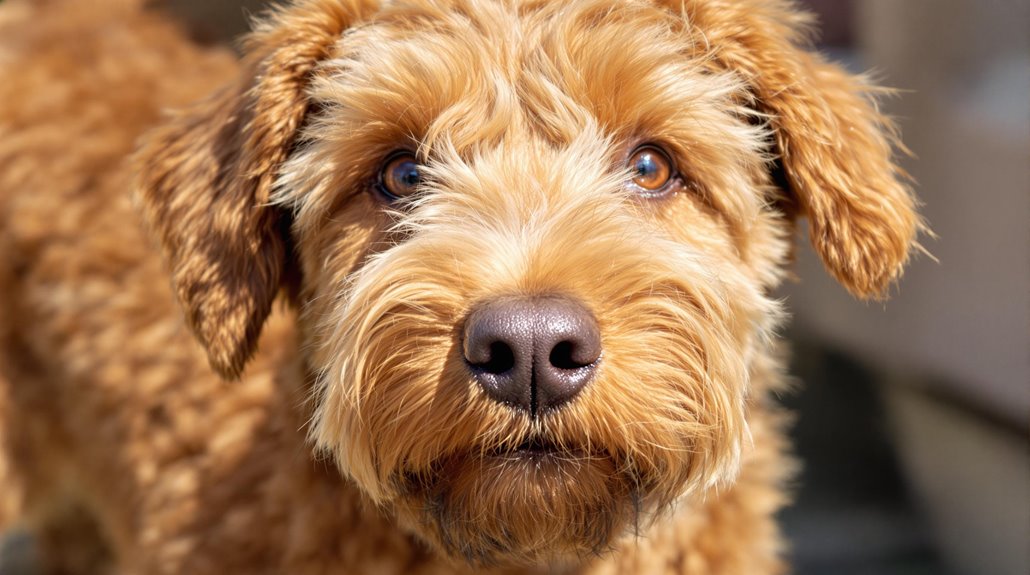
Three distinctive traits define a Boxerdoodle's personality: playfulness, intelligence, and unwavering loyalty.
You'll find these dogs bring an exceptional temperament to your household, combining the best personality traits from both parent breeds. As highly intelligent dogs, they'll enthusiastically participate in training sessions and quickly pick up new commands when you use positive reinforcement techniques.
Your Boxerdoodle will show deep affection for your family while maintaining a watchful, protective nature inherited from their Boxer lineage. These social butterflies thrive on human interaction and typically get along well with other pets, making them ideal for multi-pet households.
To keep your Boxerdoodle happy and well-adjusted, you'll need to provide:
- Daily physical exercise (1-2 hours)
- Regular mental stimulation through games and training
- Consistent social interaction with family members
- Early socialization with other dogs and people
- Structured training from puppyhood
When properly trained and exercised, Boxerdoodles channel their energy into being wonderful family companions. They'll adapt well to your lifestyle while maintaining their playful spirit and devoted nature.
Training and Exercise Needs
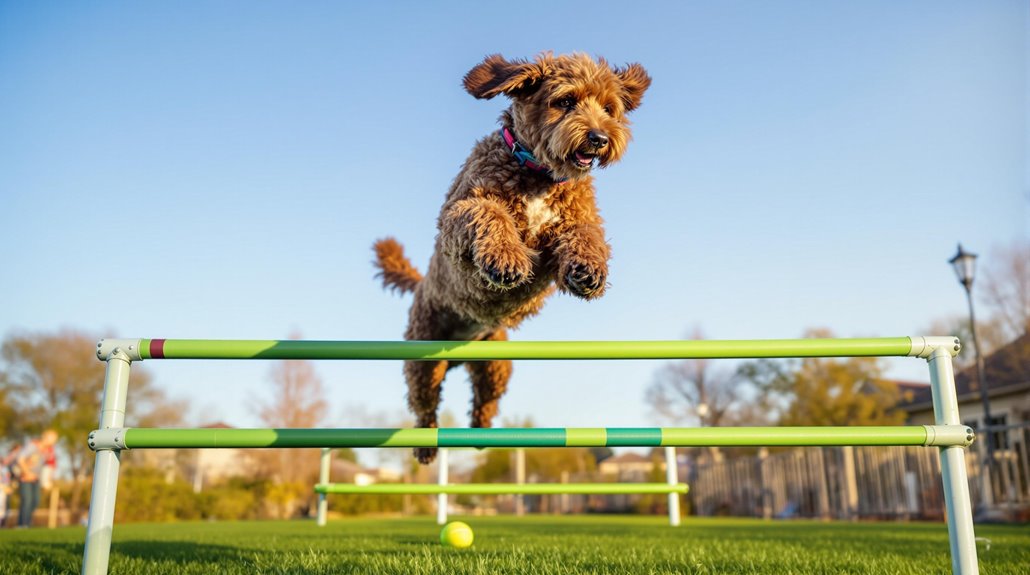
Successful training of a Boxerdoodle demands a well-rounded approach that combines daily exercise with structured learning sessions. Since these dogs possess high energy levels, you'll need to commit to 45-60 minutes of vigorous exercise daily to maintain their physical and mental well-being.
Your training and socialization efforts should begin early, as Boxerdoodles can show stubborn tendencies. You'll find that positive reinforcement techniques work best for teaching basic obedience training commands like sit, stay, and come. Keep training sessions consistent to establish clear boundaries and expectations.
To meet their exercise requirements effectively:
- Take daily brisk walks or runs
- Engage in interactive play sessions
- Provide designated playtime in a secure area
- Include mental stimulation activities
Mental enrichment is equally important as physical exercise. You should:
- Use puzzle toys and interactive games
- Practice new commands regularly
- Rotate different training activities
- Incorporate training during exercise sessions
Remember that combining physical activity with training not only satisfies their energy needs but also strengthens your bond, making future training more successful.
Health and Grooming Requirements
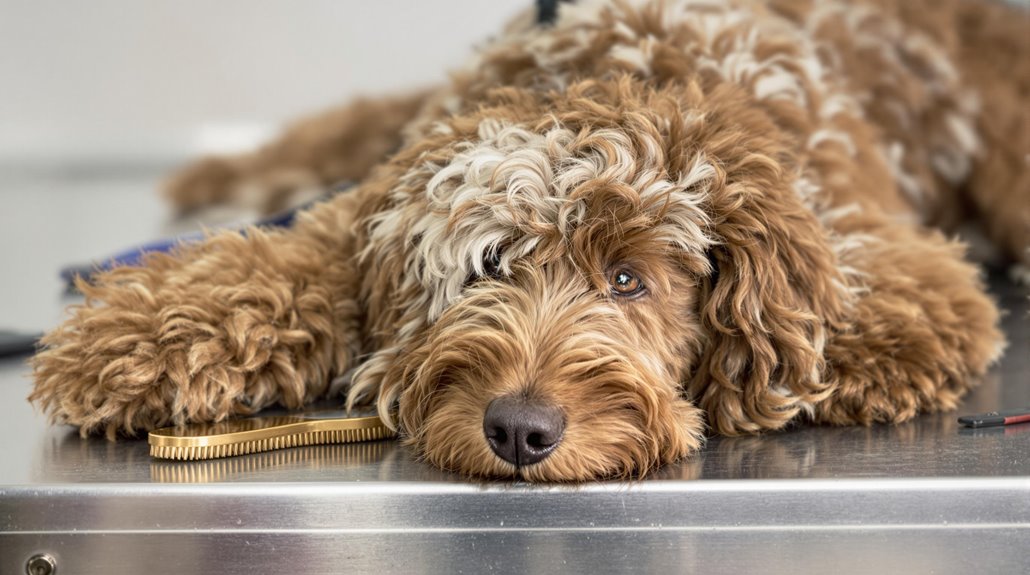
Your Boxerdoodle's grooming needs will demand consistent attention. You'll want to brush their coat at least three times weekly to prevent matting and maintain healthy fur. Routine care should include:
- Regular dental cleaning
- Professional hair trimming every 6-8 weeks
- Nail maintenance
- Bathing when necessary
A balanced diet plays an essential role in your dog's overall health. You'll want to provide food rich in omega-3 fatty acids to:
- Support joint health
- Maintain proper weight
- Boost energy levels
- Promote coat health
Finding Your Boxerdoodle Companion
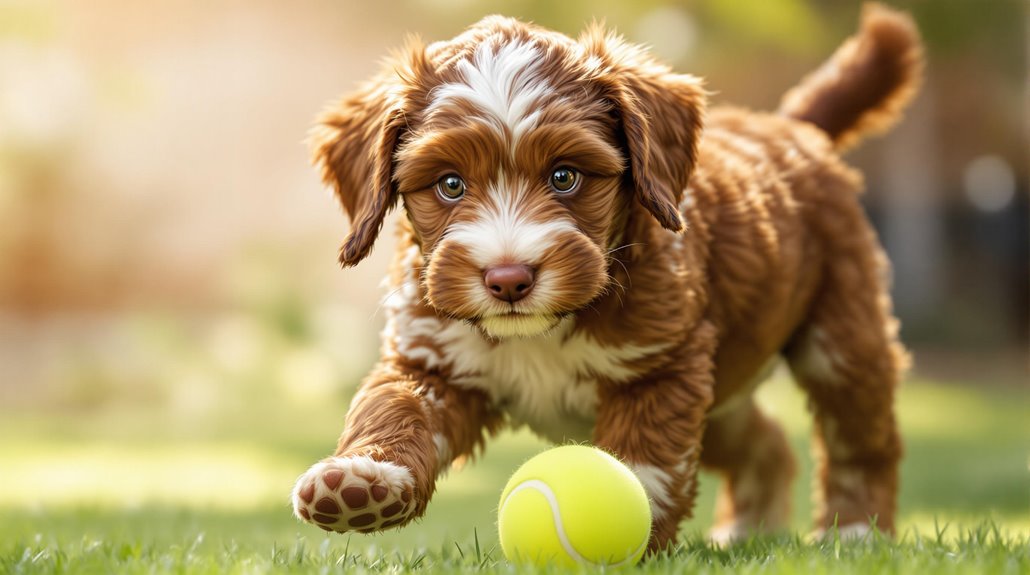
Finding a reputable Boxerdoodle breeder requires thorough research and careful consideration. When searching for your perfect Poodle mix companion, you'll want to visit breeders who prioritize health testing and early socialization of their puppies.
Before committing to a Boxerdoodle, assess whether your lifestyle matches their needs. Consider these key factors:
- Size expectations: Determine if you prefer a Standard or Mini Boxerdoodle, as their adult size can vary considerably from 12 to 80 pounds
- Activity levels: Confirm you can provide 45-60 minutes of daily exercise to keep your dog healthy and content
- Living space: Your home should accommodate their size and energy requirements
- Time commitment: Regular grooming and training sessions are essential for proper development
When visiting potential breeders, ask about:
- Health screenings for both parent breeds
- Socialization practices with puppies
- Training support after adoption
- Documentation of veterinary care
Remember that bringing a Boxerdoodle into your loving home is a long-term commitment. These intelligent, affectionate dogs thrive with dedicated owners who understand their exercise needs and training requirements. Take your time to find the right match for your family.
Designer Crossbreed Since 2000S
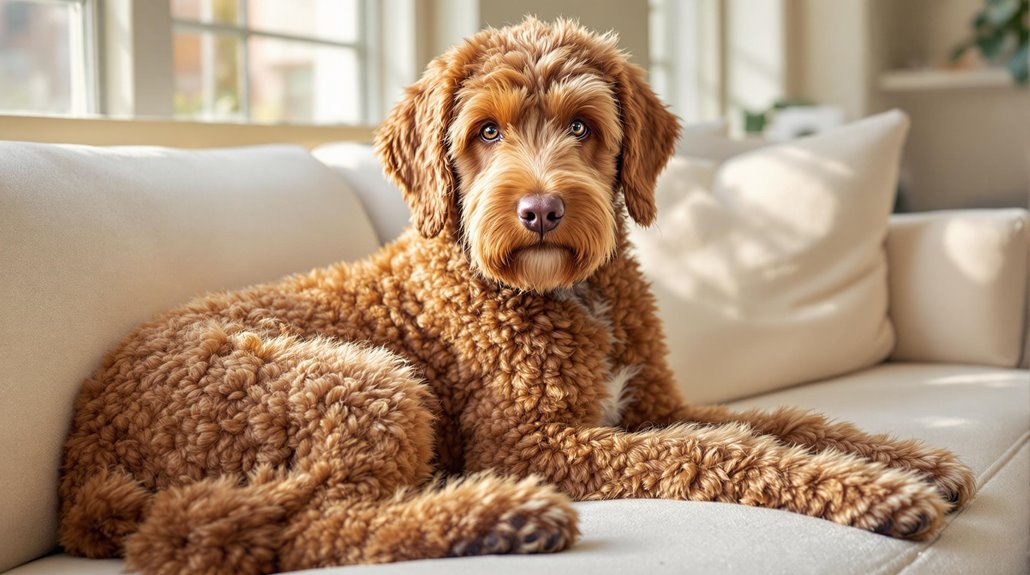
Since their emergence in the 2000s, you'll find that Boxerdoodles represent a growing trend in designer dogs that combine the best traits of both parent breeds. You can expect potential health advantages from hybrid vigor, where crossbreeding may reduce inherited genetic issues common in purebred lines. While some prefer pedigree dogs, the Boxerdoodle's popularity shows how mixed breeds offer unique combinations of temperament, appearance, and wellness that appeal to modern dog owners.
Growing Designer Dog Popularity
Creating designer dogs has revolutionized modern pet ownership, with breeds like the Boxerdoodle emerging as popular choices since the 2000s. You'll find that these hybrid breeds offer unique combinations of traits that cater to modern families' needs and lifestyle preferences.
The growing trend toward designer dogs reflects your changing priorities as a pet owner. You're likely drawn to the Boxerdoodle's appealing mix of characteristics: the loyal, protective nature of the Boxer combined with the Poodle's intelligence and low-shedding coat. This combination makes daily care and maintenance more manageable while ensuring you'll have a devoted family companion.
As you explore designer breed options, you'll notice the increasing emphasis on genetic diversity. The Boxerdoodle represents this shift, offering potential health benefits through its mixed heritage. You're part of a larger movement where pet owners actively seek out hybrid breeds that align with specific lifestyle requirements.
The surge in designer dog popularity means you'll have access to more information and resources about breeds like the Boxerdoodle. This increased awareness helps you make informed decisions about whether this particular mix suits your family's needs and capabilities.
Mixed Breed Health Benefits
Modern breeding practices have brought significant health advantages to mixed breeds like the Boxerdoodle. Thanks to hybrid vigor, you'll find these designer dogs often experience fewer genetic health issues than their purebred Boxer and Poodle parents.
When you're considering a Boxerdoodle for your family, you'll be pleased to know that this mixed breed typically enjoys several health benefits:
- Reduced risk of common purebred health problems, including hip dysplasia and certain eye conditions
- Enhanced genetic diversity that contributes to better overall well-being
- Potential for a longer lifespan, ranging from 10 to 15 years
- Lower incidence of breed-specific allergies
To maintain your Boxerdoodle's health advantages, you'll need to:
- Schedule regular veterinary check-ups
- Provide a balanced, nutritious diet
- Monitor for any inherited conditions from either parent breed
- Stay current with preventive care
Since their emergence in the 2000s, Boxerdoodles have demonstrated how thoughtful crossbreeding can promote healthier pets. While no dog is completely immune to health issues, this mixed breed's diverse genetic background often results in a more resilient companion for your household.
Pedigree Versus Hybrid Vigor
The rise of Boxerdoodles represents a fascinating shift in dog breeding philosophy: pedigree versus hybrid vigor. While purebred dogs have long been the standard, the emergence of designer breeds since the 2000s has highlighted the advantages of crossbreeding.
When you're considering a Boxerdoodle, you'll benefit from understanding hybrid vigor's impact on health. These designer dogs often experience fewer genetic disorders than their purebred parents, particularly regarding common issues like hip dysplasia and eye conditions. Here's what you should know:
- Hybrid vigor typically results in stronger immune systems and better overall health
- The mix of Boxer and Poodle genes helps reduce inherited health problems
- Responsible breeders carefully screen parent dogs to minimize genetic risks
- Each Boxerdoodle can inherit different trait combinations from both breeds
While no dog is guaranteed perfect health, working with a responsible breeder who understands hybrid vigor principles will increase your chances of getting a healthy companion. You'll want to research both parent breeds thoroughly, as this knowledge will help you anticipate potential health concerns and make informed decisions about preventive care.
Modern Companion Hybrid

Today's families seeking the perfect companion dog often discover their match in a Boxerdoodle, an increasingly popular hybrid that blends the Boxer's playful spirit with the Poodle's quick wit. This modern hybrid brings together the best traits from both breeds, creating a versatile family companion that adapts well to various living situations.
You'll find that Boxerdoodles come in a range of sizes to suit your lifestyle, from a compact 12 pounds to a robust 80 pounds. Their high energy levels mean you'll need to commit to 45-60 minutes of daily exercise, making them ideal partners for active families who enjoy outdoor activities.
If you're looking for a dog that'll fit seamlessly into your family dynamic, you'll appreciate the Boxerdoodle's affectionate temperament and social nature. They excel in family settings, showing patience with children and enthusiasm for group activities. With a lifespan of 10-12 years, you can expect a decade of loyal companionship from these intelligent pets. Their hybrid vigor often translates to fewer health concerns, though you'll still want to monitor for common issues like hip dysplasia.
Body Frame Is Muscular
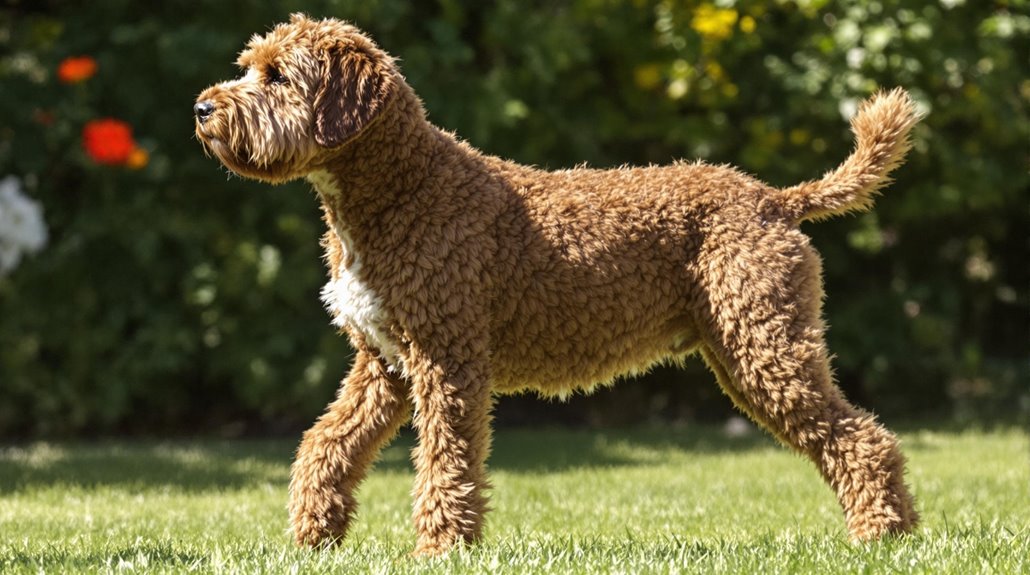
Your Boxerdoodle's muscular frame showcases itself in a height range of 15-25 inches, making them an ideal medium-sized companion. Their distinctive wavy or curly coat, inherited from their Poodle parent, adds to their athletic appearance while providing good protection. You'll need to maintain their coat with brushing twice per week to keep it free from tangles and looking its best.
Height Ranges 15-25 Inches
Standing between 15 and 25 inches tall, Boxerdoodles showcase an impressive muscular frame that reflects their mixed heritage. The height ranges you'll encounter depend largely on whether your pup inherits genes from a Standard or Miniature Poodle parent, creating notable size variations within the breed.
When you're considering a Boxerdoodle for your family, it's important to understand their size potential. Adult Boxerdoodles from Standard Poodle lineage typically reach the upper end of the height spectrum, while those with Miniature Poodle genetics tend to stay closer to 15 inches. This size flexibility makes them adaptable to different living situations, from spacious homes to moderate-sized apartments.
Your Boxerdoodle's height and muscular build will influence their exercise needs. You'll need to commit to at least 45 minutes of daily activity to maintain their physical health and active nature. Regular exercise isn't just about preventing obesity – it's essential for their overall well-being and helps channel their energy positively. Consider activities that match their size and strength, such as jogging, hiking, or structured play sessions in a fenced yard.
Wavy or Curly Coat
Beyond their impressive height, Boxerdoodles showcase distinctive coat patterns that range from wavy to tightly curled, thanks to their Poodle heritage. These unique coat characteristics, inherited through Poodle genes, contribute greatly to their appealing appearance and maintenance requirements.
You'll find that your Boxerdoodle's coat type directly impacts their grooming needs. If your dog inherits a wavy coat, you'll typically spend less time on maintenance, while curly-coated Boxerdoodles require more frequent brushing to prevent matting. Regular grooming sessions help maintain their coat's health and appearance.
Their muscular frame complements their coat beautifully, reflecting their active nature and need for daily exercise. You'll need to provide at least 45 minutes of physical activity each day to keep your Boxerdoodle healthy and prevent weight issues. Their strong build makes them excellent partners for:
- Running and jogging sessions
- Interactive fetch games
- Canine sports activities
- Family outdoor adventures
When you're considering a Boxerdoodle, remember that their coat maintenance and exercise needs go hand in hand. Their combination of a distinctive coat and athletic build makes them ideal companions for active families committed to regular grooming and exercise routines.
Brushing Twice per Week
Regular brush sessions play an essential role in maintaining your Boxerdoodle's coat and muscular frame. You'll need to commit to brushing at least twice weekly to prevent matting and manage shedding, which can vary depending on your dog's coat type.
For Boxerdoodles with curlier coats, you'll want to pay special attention during grooming sessions, as their fur can easily trap dirt and debris. Using the right tools, such as a slicker brush or grooming glove, will make the process more effective and comfortable for your active dog.
Your Boxerdoodle's muscular build requires particular attention to coat health, as proper brushing helps prevent skin irritations that can develop from excessive shedding. During these regular grooming sessions, you'll have the perfect opportunity to check for:
- Areas of matted fur
- Signs of skin issues or irritation
- Presence of parasites
- Overall coat condition
- Any unusual bumps or growths
Loving yet Protective Nature
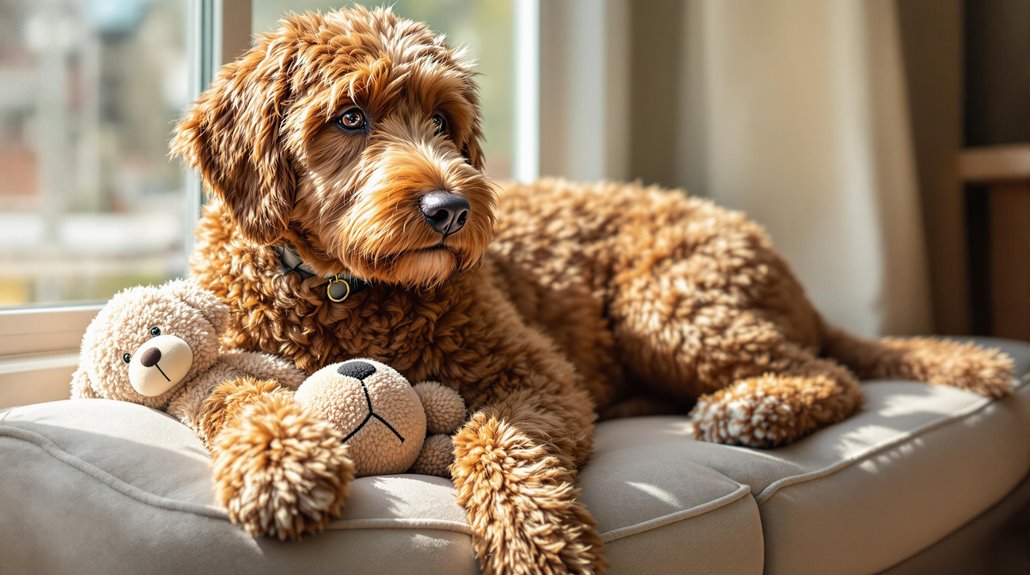
Your Boxerdoodle's quick grasp of commands and gentle nature with children make them an ideal family companion, though you'll need to maintain consistent training to channel their protective instincts. You'll find their intelligence shines through daily training sessions, where they enthusiastically learn new skills and proper social behaviors. Your new friend will require plenty of energetic exercise to stay balanced, which helps them develop into well-adjusted guardians who know when to be playful and when to be protective.
Quick Learner With Commands
The Boxerdoodle's exceptional intelligence and enthusiasm to please make it a standout student when learning commands and training routines. You'll find these clever canines pick up new skills quickly, especially when you use positive reinforcement techniques during training sessions.
To make the most of your Boxerdoodle's natural learning abilities, you'll want to:
- Start training early to channel their protective instincts positively
- Dedicate at least 60 minutes daily to exercise, which enhances their focus during training
- Use treats and praise consistently to reinforce desired behaviors
- Incorporate socialization exercises to develop well-rounded behaviors
Your Boxerdoodle's quick-learning capabilities extend beyond basic commands. They're particularly adept at:
- Learning watchdog behaviors
- Mastering complex training routines
- Adapting to different training techniques
- Understanding household rules and boundaries
Remember that your Boxerdoodle's intelligence needs regular stimulation through training exercises. Combining physical activity with mental challenges will help maintain their sharp minds and prevent boredom. You'll find that consistent training sessions not only improve their behavior but also strengthen your bond with these intelligent companions.
Gentle With Young Children
While many dog breeds claim to be family-friendly, Boxerdoodles truly excel at forming gentle bonds with young children. These devoted companions blend the protective nature of Boxers with a patient temperament that makes them ideal for families with children, particularly those with kids old enough for active play.
You'll find that early socialization plays a vital role in developing your Boxerdoodle's kid-friendly traits. When properly trained from puppyhood, these dogs become reliable family members who understand how to interact safely with children. Their natural playful disposition encourages positive experiences, while their patient nature helps them tolerate the occasional enthusiastic handling by young ones.
However, you'll need to maintain supervision during playtime, especially with smaller children. While Boxerdoodles are gentle by nature, their energetic play style can sometimes be overwhelming for toddlers. Consider these guidelines for success:
- Establish consistent rules for both children and dog
- Monitor all interactions between your Boxerdoodle and young kids
- Create structured play sessions that help your dog learn appropriate behavior
- Reward calm, gentle interactions to reinforce positive conduct
Energetic Daily Exercise Needed
Maintaining a happy, well-behaved Boxerdoodle goes beyond their gentle interactions with children – these dynamic dogs need substantial daily exercise to thrive. Your Boxerdoodle will require 45-60 minutes of vigorous physical activity every day to maintain both their physical health and mental stimulation.
To meet your Boxerdoodle's exercise needs, you'll want to:
- Take them on brisk daily walks or jogs
- Engage in interactive play sessions
- Plan regular hiking adventures
- Set up agility courses in your yard
- Schedule puppy playdates for socialization
These energetic dogs are perfectly suited for active families who enjoy outdoor activities and can commit to regular exercise routines. Without proper physical outlets, your Boxerdoodle may develop unwanted behaviors from pent-up energy. The good news is that while exercising your dog, you're also nurturing their protective instincts and building their confidence through environmental exposure.
Remember that exercise isn't just about physical activity – it's also essential for your Boxerdoodle's mental development and social skills. Regular outings provide opportunities for them to interact with other dogs and people, helping them become well-adjusted family companions.
Hip and Joint Screening
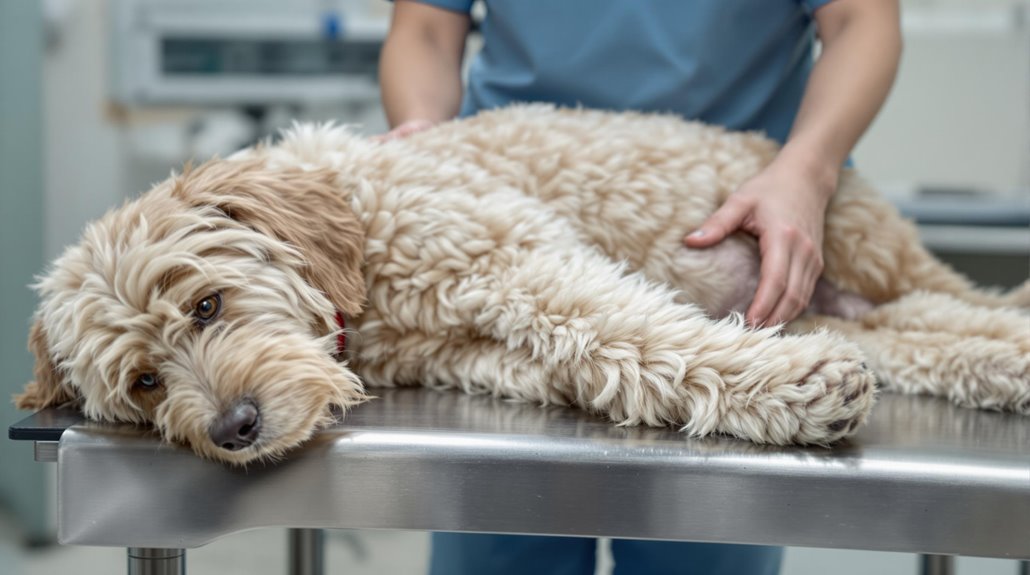
Your Boxerdoodle will need careful monitoring for hip dysplasia and joint issues throughout their 0-12 year lifespan, making regular veterinary screenings essential. While checking their hips, you'll want to schedule routine dental cleanings to maintain their overall health and prevent complications that could impact their quality of life. Your vet can help create a thorough screening schedule that includes tests for common conditions like bloat, which is particularly important given their mixed heritage from both Boxer and Poodle bloodlines.
Hip Dysplasia and Bloat
Like many larger mixed breeds, Boxerdoodles can inherit several health concerns that require careful monitoring and preventive care. Two significant conditions you'll need to watch for are hip dysplasia and bloat, both of which can seriously impact your dog's quality of life.
Hip dysplasia, a genetic condition affecting the hip joints, may cause your Boxerdoodle to show signs like:
- Difficulty getting up from a lying position
- Reluctance to exercise or play
- Unusual walking patterns
- Signs of pain during movement
Bloat, or gastric dilatation-volvulus (GDV), requires immediate emergency care. You can reduce its risk by:
- Serving smaller meals throughout the day
- Avoiding exercise right after meals
- Watching for signs of stomach distension
Before bringing home your Boxerdoodle puppy, you'll want to request health clearances from the breeder for both parent breeds. These screening recommendations are essential, particularly for hip evaluations. Working with a reputable breeder who provides these preventive measures will give your future companion the best chance at a healthy life.
0-12 Years Average Lifespan
Regular screenings throughout your Boxerdoodle's life play an essential role in protecting their joints and extending their 10-15 year average lifespan.
To support your Boxerdoodle's joint health, consider these vital screening practices:
- Schedule hip and joint evaluations every 2 years, starting from puppyhood
- Monitor weight regularly to prevent obesity, which can strain joints
- Request specific screenings for hip dysplasia, a common concern in this breed
- Maintain detailed health records to track changes in mobility and joint function
Working with reputable breeders who conduct thorough health screenings on parent dogs helps reduce your puppy's risk of inherited joint conditions. As a responsible owner, you'll want to:
- Partner with a veterinarian experienced in treating designer breeds
- Follow recommended exercise guidelines to strengthen joints without overexertion
- Implement preventive care measures based on screening results
- Consider joint supplements if recommended by your vet
Early detection through consistent health screenings allows for prompt intervention when issues arise. By staying proactive with your Boxerdoodle's joint health, you're helping guarantee they remain active and comfortable throughout their life.
Regular Dental Cleanings
Maintaining proper dental hygiene alongside joint health screenings creates a thorough wellness approach for your Boxerdoodle. Regular dental cleanings play an essential role in preventing dental issues that can affect your dog's overall health and happiness.
Key Dental & Joint Care Requirements:
- Schedule professional dental cleanings as recommended by your vet
- Monitor for signs of periodontal disease, which affects 80% of dogs by age 3
- Combine dental care with hip and joint screenings to catch potential problems early
- Implement proactive management strategies based on screening results
Your Boxerdoodle's health depends on consistent vet check-ups that include both dental and joint evaluations. Early detection of health problems through these screenings can save you money while protecting your dog's quality of life. By investing in preventive care, you're helping your Boxerdoodle avoid serious complications that could develop from untreated dental or joint conditions.
Regular Monitoring Schedule:
- Annual dental examinations
- Hip and joint assessments during routine checkups
- Dental cleanings as prescribed by your veterinarian
- Immediate evaluation if you notice changes in eating habits or mobility
Regular Groomer Visits Essential
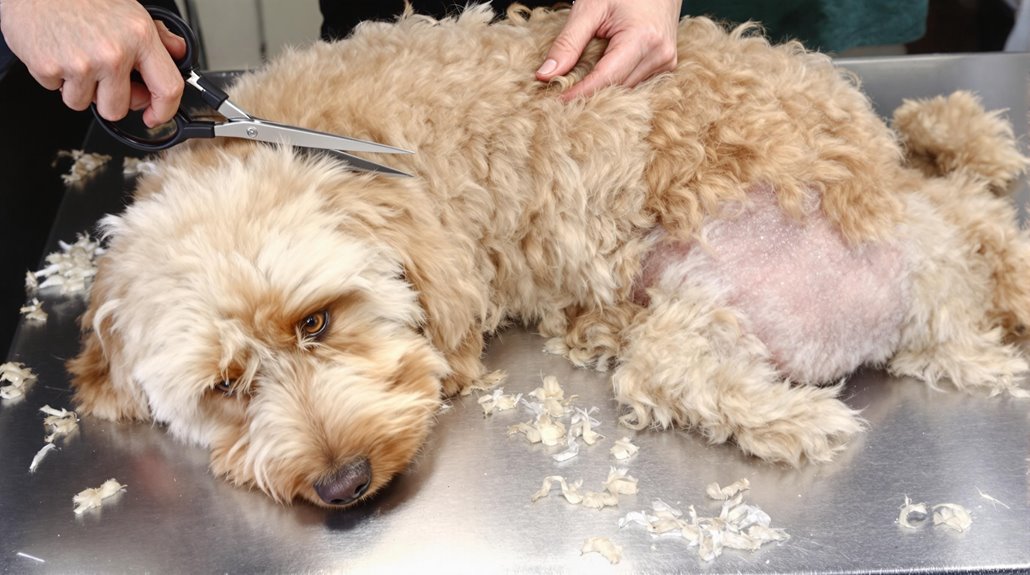
Professional groomer visits play an essential role in your Boxerdoodle's health and appearance, especially if they've inherited the Poodle's curly coat. Regular grooming helps prevent matting and tangling while managing medium to high shedding patterns that are common in this mixed breed. During these visits, groomers can perform overall health checks to identify potential skin issues early.
You'll want to establish a consistent grooming schedule that includes both at-home care and professional sessions. Your groomer will help maintain proper coat health through specialized techniques and tools that might not be available for home use. They'll also address important aspects of care that you might overlook.
- Regular professional grooming prevents severe matting that can lead to skin problems and discomfort
- Professional groomers can spot early signs of parasites, infections, or unusual skin conditions
- Grooming sessions include essential services like nail trimming, ear cleaning, and sanitary trimming
- Your groomer can recommend the best brushing techniques and tools for your Boxerdoodle's specific coat type
Maintaining a schedule of professional grooming appointments every 6-8 weeks, combined with your at-home care routine, will keep your Boxerdoodle healthy and comfortable.
Annual Insurance Premiums $600-900
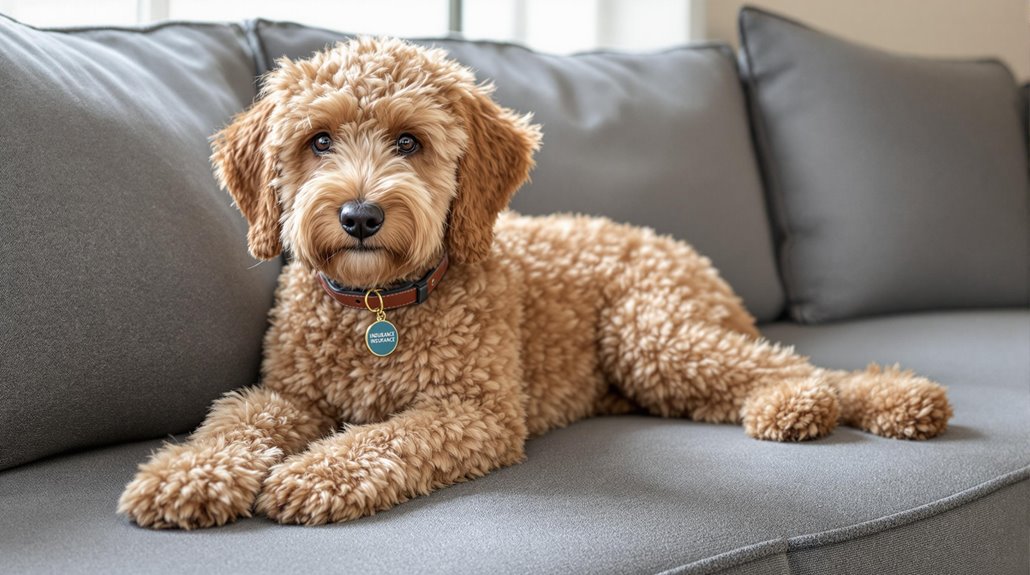
Pet insurance costs for Boxerdoodles typically range from $600 to $900 annually, with rates varying based on your location and chosen coverage plan. When selecting coverage for your furry companion, you'll want to evaluate their health history and potential inherited conditions from both Boxer and Poodle bloodlines.
| Coverage Type | Average Cost | What's Included |
|---|---|---|
| Basic Plan | $600-700 | Accidents & Emergencies |
| Standard Plan | $700-800 | Basic + Illness Coverage |
| Premium Plan | $800-900 | Full Coverage + Wellness |
When researching insurance providers, you'll find various coverage options tailored to your Boxerdoodle's needs. Many companies offer wellness plans that cover routine care, including vaccinations and annual checkups. You'll want to compare multiple providers to find the best value for your investment.
Evaluate these key factors when selecting insurance:
- Your dog's age and current health status
- Geographic location and local veterinary costs
- Deductible amounts and reimbursement percentages
- Coverage for breed-specific conditions
- Waiting periods for coverage to begin
- Annual limits and lifetime maximums
Research Breeder Health Guarantees

While insurance protects your Boxerdoodle after adoption, securing a thorough health guarantee from your breeder provides critical protection from day one. When you research breeder health guarantees, focus on written documentation that covers common genetic disorders for 1-3 years.
Look for breeders who demonstrate their commitment to ethical breeding practices through extensive health testing of parent dogs. They should provide:
- Documentation of hip and eye examinations
- Screening results for conditions common in both Boxers and Poodles
- Clear explanations of covered health conditions
- Written terms of the health guarantee
- Details about return policies or health support
Ask specific questions about how the breeder handles potential health issues in Boxerdoodle puppies after adoption. A responsible breeder will:
- Share complete health records
- Discuss family medical history
- Explain their health guarantee terms
- Provide ongoing support for health concerns
- Maintain transparency about genetic testing
Cost to Feed Monthly
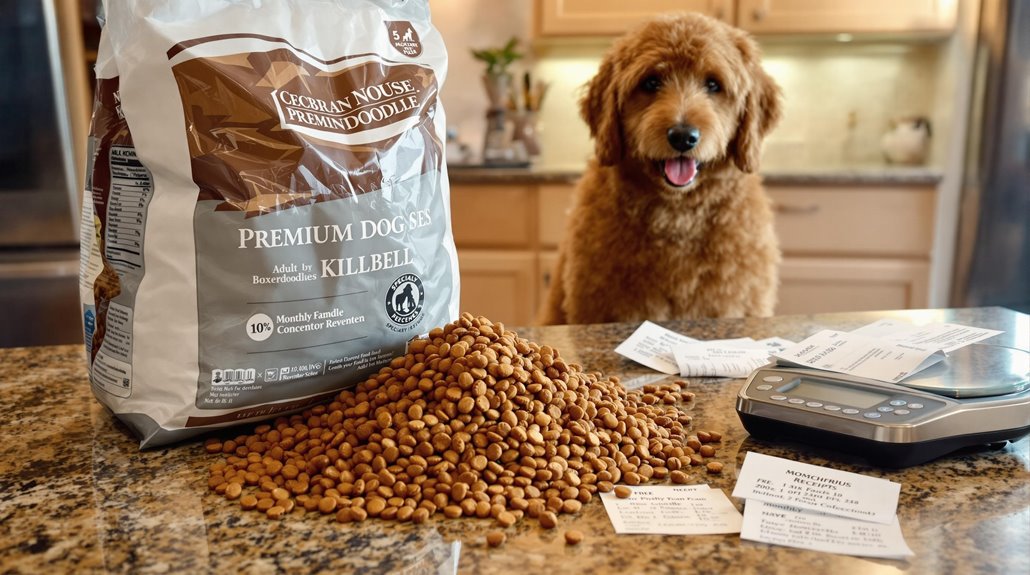
Monthly food expenses for your Boxerdoodle will typically range from $50 to $100, depending on your choice of food quality and your dog's size and activity level. To maintain a healthy, nutritious dog, you'll want to invest in high-quality dog food designed specifically for large breeds, which costs about $2 to $4 per pound.
Your Boxerdoodle will need approximately 2 to 3 cups of food daily, adding up to 60-90 cups monthly. When planning your feeding budget, consider these key factors:
- Select food with appropriate calories and fat content to match your dog's activity level
- Factor in treats for training and rewards ($10-$30 monthly)
- Include any necessary dietary supplements based on your vet's recommendations
- Choose large-breed formulas that support joint health
To keep costs manageable while ensuring proper nutrition, you can:
- Buy in bulk when your preferred brand is on sale
- Sign up for auto-delivery services that offer discounts
- Track your dog's food consumption to avoid overfeeding
- Compare prices across reliable retailers while maintaining food quality
- Consider mixing wet and dry food to balance nutrition and costs
Frequently Asked Questions
What Are the Pros and Cons of Boxerdoodles?
Pros:
- You'll find they're incredibly friendly and great with families
- Their intelligence makes them responsive to positive training
- They can be less prone to shedding, suiting mild allergy sufferers
Cons:
- You'll need to commit to 45-60 minutes of daily exercise
- Regular grooming needs can be time-consuming
- They may show stubborn streaks, requiring consistent training
- Early socialization is essential to manage their behavior
What Is the Healthiest Poodle Mix Breed?
While there's no "perfect" poodle mix, the Goldendoodle consistently ranks among the healthiest due to its exceptional genetic diversity. You'll find they benefit from a remarkable combination of the Golden Retriever's sturdy constitution and the Poodle's intelligence. They typically enjoy a 10-15 year lifespan with fewer breed-specific health issues than other mixes. Their robust immune systems and reduced risk of hereditary conditions make them stand out, though you'll still need to maintain regular vet check-ups and proper care.
How Big Will a Boxer Doodle Get?
Your Boxerdoodle's size will vary considerably based on whether you choose a Standard or Mini variety. A Standard Boxerdoodle can reach 40-70 pounds and stand 21-27 inches tall, while Mini Boxerdoodles typically weigh 20-50 pounds and measure 12-20 inches in height. Your pup's final size depends on which Poodle parent (Standard or Miniature) is used in breeding, along with factors like diet and exercise during their growth period.
What Is the Most Sought After Poodle Mix?
Like stars in the designer dog galaxy, Goldendoodles shine brightest among Poodle mixes. You'll find they're consistently ranked as the most sought-after Poodle cross, followed closely by Labradoodles and Cockapoos. While Boxerdoodles are gaining popularity, they haven't reached the same demand level as these top three. Goldendoodles win hearts with their perfect blend of intelligence, gentle nature, and low-shedding coats. They're especially popular with families seeking an allergy-friendly companion with a golden retriever's temperament.
Conclusion
Before you jump in with both feet, carefully weigh if a Boxerdoodle matches your lifestyle and resources. You'll need time for exercise and training, a budget for grooming and healthcare costs, and commitment to this intelligent hybrid's needs. While these loyal companions bring joy to the right homes, they aren't for everyone. Consider your space, schedule, and finances to determine if this playful mix is your perfect match.
